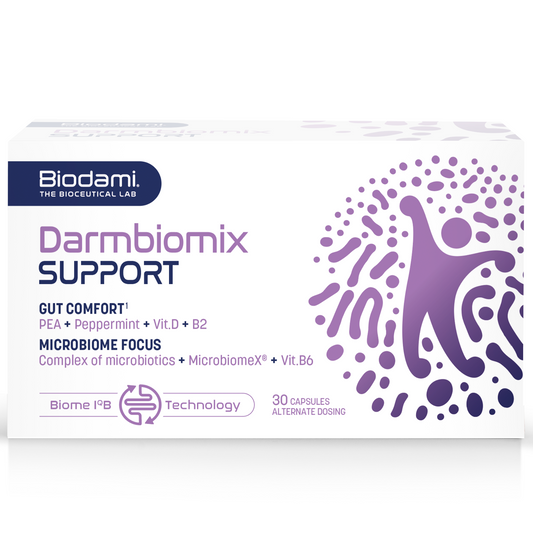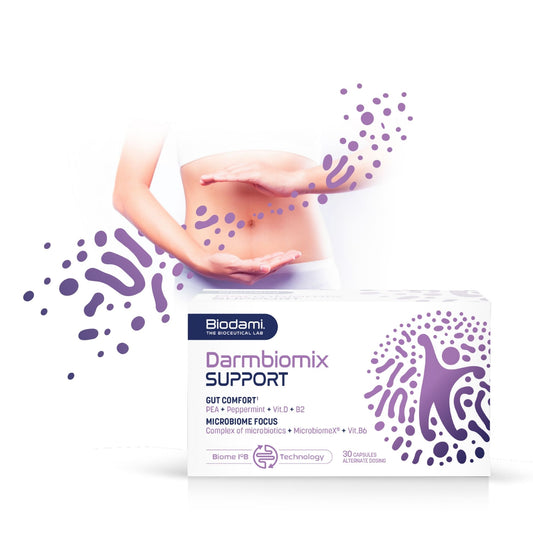Introduction to Irritable Bowel Syndrome (IBS)
Irritable Bowel Syndrome (IBS) is a prevalent and often debilitating functional gastrointestinal disorder, affecting a vast number of individuals worldwide. Despite its common occurrence (10-15%) significant healthcare costs (up to €1600), and substantial impact on the quality of life, the understanding of IBS's etiology has historically been limited. However, recent advancements have shed light on the crucial role of microbial factors in the pathophysiology of IBS, garnering increasing interest in exploring the microbiome, especially as current treatments don’t always prove efficacious, highlighting an unmet need.
(READ MORE ON THE SYMPTOMS, CAUSES OF IBS)
The Evolving Understanding of IBS
Classically, IBS was regarded as a form of gut-brain axis dysfunction. Miscommunication between neuroendocrine signaling and effector nerves (nerves that are part of the nervous system that carry signals away from the central nervous system (the brain and spinal cord) to various parts of the body in order to elicit a response) within the gastrointestinal tract, caused by psychosocial stressors, was thought to lead to visceral hypersensitivity and altered motility (the movements of the digestive system, specifically the contractions of the muscles in the gastrointestinal (GI) tract). However, this model is now considered too reductive.
New evidence suggests the involvement of additional factors, including exposure to environmental stimuli such as food, infections, antibiotic treatment, and other psychosocial events. These factors, combined with genetic predispositions and epigenetic changes (changes in gene expression), may lead to modifications in the function of the epithelial gut barrier, causing increased permeability, excessive passage of antigens and toxins, and the activation of both intestinal and brain immune and neuroendocrine responses.

The Chain of Events Leading to IBS Symptoms
This combination of events triggers a low-grade, non-infectious inflammation and changes in the gut microbiome composition and function, ultimately leading to improper release and movement responses in the gut, causing classic IBS symptoms.
Clinical studies suggest that IBS often starts after a person has a gastrointestinal infection, which can be caused by bacteria, viruses, or parasites. This connection indicates that an imbalance in gut bacteria, known as dysbiosis, might play a role in developing IBS. Dysbiosis could also result from the immune system reacting to the infection, which can change how the gut moves and becomes more sensitive, leading to increased gut symptoms and worsening of IBS

fig. 1. Microbial hypothesis in irritable bowel syndrome (Pimentel & Lembo, 2020)
The Importance of Microorganisms in Gut Motility
Additional research highlights that gut microorganisms are crucial for maintaining proper movement within the gastrointestinal (GI) tract. Serotonin, produced by specific cells in the intestines, and histamine, released by mast cells in the gut lining, play roles in inflammation and maintaining the integrity of the intestinal barrier. Serotonin is also linked to increased gut sensitivity. Moreover, in people with IBS, mast cells in the gut are more numerous and more active compared to those without the condition.
The Role of PalmitoylEthanolamide (PEA) in IBS Treatment
PalmitoylEthanolamide (PEA), a key component in Darmbiomix Support, helps to reduce the immune response triggered by mast cells. A study by Cremon et al., involving 54 IBS patients and 12 healthy individuals across five European centers, found that IBS patients had higher numbers of mast cells in their gut lining and different levels of certain fatty acids and cannabinoid receptors than healthy controls. Although PEA treatment did not change the biological markers of IBS, including mast cell count, it significantly relieved abdominal pain compared to a placebo. This suggests PEA's potential as a therapeutic agent for pain in IBS patients. Additionally, the gut microbiome is thought to influence serotonin production, offering another way it might impact the gut-brain connection and IBS symptoms.

The Gut Microbiome: A Neglected Organ

Often overlooked, the gut microbiome contains about 400 species and has more cells than all other human organs combined. Commensal bacteria, which are the beneficial bacteria that coexist without harming the host, are essential for digestion. They produce enzymes and metabolites that help the body absorb nutrients and vitamins. These bacteria are crucial for the development and functioning of the intestinal immune system, which needs to be tolerant to food and friendly bacteria while also being capable of fighting off pathogens. Commensal bacteria maintain gut balance by producing substances that inhibit harmful bacteria and strengthen defenses against unwanted invaders. They also prevent harmful organisms from establishing themselves in the gut by competing for resources and occupying key spaces.
Quantitative and Qualitative Differences in IBS Patients' Gut Microbiome
The gut microbiome seems to be very important in IBS. Studies have shown that people with IBS have different amounts and types of gut bacteria compared to healthy people. For example, those with more unstable gut bacteria often experience more severe symptoms of IBS. Additionally, certain symptoms of IBS, like bloating, feeling full quickly, and changes in how quickly food moves through the gut, are linked to specific patterns of gut bacteria in people with IBS
Key Ways the Microbiome Affects IBS:
Impaired Gut Barrier: In IBS, the protective layer of the intestine doesn't work well, leading to a "leaky" gut. This allows bacteria and other microbial elements to pass through more easily. When these microbes reach the immune layer of the gut, they trigger improper inflammatory reactions that cause IBS symptoms. Issues with proteins that help seal the gut (tight junction proteins) have been noted in IBS, contributing to this problem.

Aberrant Immune Response: In IBS, the lining of the intestines becomes overly active immunologically, as shown by the increased production of molecules that promote inflammation, called pro-inflammatory cytokines. This inflammation in the gut lining might be caused directly by microbes that have crossed into the intestinal tissue or indirectly by substances these microbes release (due to the leaky gut). The immune system in IBS tends to favor these inflammatory pathways. This immune activity in the gut lining is linked to visceral hypersensitivity, which means an increased sensitivity to pain from the intestines, contributing to the abdominal pain experienced in IBS.
Molecular Mimicry: In IBS, some microbial antigens (substances that trigger immune responses) are similar in structure to the body's own proteins. This similarity can cause the immune system to mistakenly attack the body's own cells, thinking they are invaders. This is known as molecular mimicry. This attack can therefore affect nerve function in the intestines leading to ongoing inflammation and potentially damage in the gut.
Brain–Gut Axis: This refers to the complex communication system between the gut and the brain. The gut's microbes interact with the brain and the local nervous system in the gut through various signals involving nerves, hormones, and the immune system. These interactions can influence how the brain and gut function. For example, substances produced by gut bacteria, such as short-chain fatty acids, can affect how brain signals are transmitted or lead to genetic changes that impact nerve functions. Stress can also alter the types and functions of gut bacteria, which affects gut movement, fluid secretion, and the barrier function of the gut lining. This is mainly controlled by the stress-response system involving the brain and adrenal glands.
Epigenetic Changes: Certain byproducts of gut bacteria, notably short-chain fatty acids like butyrate, can lead to epigenetic changes—modifications that affect gene activity without changing the DNA sequence. Butyrate, a compound from gut bacteria, can block certain enzymes. This action causes a buildup of specific groups on DNA-packaging proteins, making the DNA more accessible and possibly changing how genes work. These changes can impact the gut and brain, potentially influencing conditions like irritable bowel syndrome (IBS) by altering the activity of genes related to these areas.
Recommendations to Treat IBS
Although irritable bowel syndrome (IBS) doesn't increase the risk of death, it does lead to more health problems. People with IBS usually have a lower quality of life than the general population and those with other chronic illnesses. There is a continued need for effective treatments for IBS. Introducing new products that can be added to the existing treatment options is important to help improve the well-being and quality of life of those with IBS. In our blog, we have outlined various recommended treatments. One promising area of treatment is focusing on the gut's microbiome, specifically using probiotics.
Probiotics: A Promising Treatment for IBS
Probiotics can improve Irritable Bowel Syndrome (IBS) symptoms through several mechanisms:
- Restoring Microbial Balance: IBS is often associated with dysbiosis, an imbalance in the gut microbiota. Probiotics introduce beneficial bacteria to the gut, which can help restore a healthy balance of microorganisms. This restoration can alleviate common IBS symptoms like bloating, gas, and discomfort.
- Enhancing Gut Barrier Function: Probiotics can strengthen the gut barrier, reducing intestinal permeability. A stronger gut barrier prevents harmful substances and bacteria from entering the bloodstream, which can reduce inflammation and alleviate IBS symptoms.
- Modulating the Immune System: Probiotics can influence the immune response in the gut. They can help reduce low-grade inflammation often seen in IBS, which can alleviate pain and discomfort.
- Regulating Bowel Movements: Probiotics can help normalize bowel movements. In cases of IBS with diarrhea (IBS-D), certain probiotic strains can reduce the frequency and improve stool consistency. Conversely, in IBS with constipation (IBS-C), they can help increase bowel movement frequency and soften stools.
- Reducing Visceral Hypersensitivity: Some probiotics may reduce visceral hypersensitivity – a condition where the nerves in the gut become overly sensitive, causing pain. By reducing this sensitivity, probiotics can lessen abdominal pain associated with IBS.
- Producing Beneficial Metabolites: Probiotics can produce short-chain fatty acids (SCFAs) and other metabolites beneficial for gut health. These metabolites can improve gut motility, enhance nutrient absorption, and support overall digestive health.
- Alleviating Psychological Symptoms: There is growing evidence of the gut-brain axis, where the gut health impacts mental health. Probiotics may help reduce anxiety and depression symptoms, which are commonly associated with IBS.
A recent meta-analysis that included 15 controlled trials concluded that probiotics reduce pain and symptom severity scores. Another study also shows a significantly greater percentage of patients receiving the probiotic combination reported adequate relief of IBS compared to placebo (48% vs. 12%, p = 0.01 reporting adequate relief for > 50% of weeks). Stool consistency also improved significantly with probiotics versus placebo.
Conclusion
Kristina Cueva
Kristina has always had a passion for understanding diseases and their underlying mechanisms. With a Biomedical sciences background as well as Public Health & Economics, Kristina understands the burdens diseases have on society. This helps her understand the necessary innovations to promote good health which ultimately lower burden of disease.
References:
Bennet SM, Ohman L, Simren M. Gut microbiota as potential orchestrators of irritable bowel syndrome. Gut Liver. 2015 May 23;9(3):318-31. doi: 10.5009/gnl14344. PMID: 25918261; PMCID: PMC4413965.
Kindt S, Louis H, De Schepper H, Arts J, Caenepeel P, De Looze D, Gerkens A, Holvoet T, Latour P, Mahler T, Mokaddem F, Nullens S, Piessevaux H, Poortmans P, Rasschaert G, Surmont M, Vafa H, Van Malderen K, Vanuytsel T, Wuestenberghs F, Tack J. Belgian consensus on irritable bowel syndrome. Acta Gastroenterol Belg. 2022 Apr-Jun;85(2):360-382. doi: 10.51821/85.2.10100. PMID: 35709780.
Napolitano M, Fasulo E, Ungaro F, Massimino L, Sinagra E, Danese S, Mandarino FV. Gut Dysbiosis in Irritable Bowel Syndrome: A Narrative Review on Correlation with Disease Subtypes and Novel Therapeutic Implications. Microorganisms. 2023 Sep 22;11(10):2369. doi: 10.3390/microorganisms11102369. PMID: 37894027; PMCID: PMC10609453.
Pimentel M, Lembo A. Microbiome and Its Role in Irritable Bowel Syndrome. Dig Dis Sci. 2020 Mar;65(3):829-839. doi: 10.1007/s10620-020-06109-5. PMID: 32026278.
Quigley EM, Bytzer P, Jones R, Mearin F. Irritable bowel syndrome: the burden and unmet needs in Europe. Dig Liver Dis. 2006 Oct;38(10):717-23. doi: 10.1016/j.dld.2006.05.009. Epub 2006 Jun 27. PMID: 16807154.




